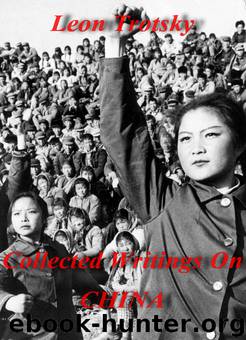Collected Writings on China by Trotsky Leon

Author:Trotsky, Leon [Trotsky, Leon]
Language: eng
Format: epub
Publisher: Marxists Internet Archive
Published: 2014-01-15T16:00:00+00:00
6) How the Shanghai Coup Took Place
In this connection we have the exceptionally valuable testimony of a witness and participant, the Stalinist Khitarov, who arrived from China on the eve of the Fifteenth Congress and appeared there with his information. The most important points of his narrative have been deleted by Stalin from the Minutes with the consent of Khitarov himself: the truth cannot be made public if it so crushingly proves all the accusations the Opposition directed against Stalin. Let us give the floor to Khitarov [8]:
“The first bloody wound has been inflicted upon the Chinese revolution in Shanghai by the execution of the Shanghai workers on April 11-12.
“I would like to speak in greater detail about this coup because I know that in our party little is known about it. In Shanghai there existed for a period of 21 days the so-called People’s Government in which the Communists had a majority. We can therefore say that for 21 days Shanghai had a Communist government. This Communist government, however, showed complete inactivity in spite of the fact that the coup by Chiang Kai-shek was expected any day.
“The Communist government, in the first place, did not begin to work for a long time under the excuse that, on the one hand, the bourgeois part of the government did not want to get to work, sabotaging it, and, on the other hand, because the Wuhan government did not approve of the composition of the Shanghai government. Of the activity of this government three decrees are known, and one of them, by the way, speaks of the preparation of a triumphal reception to Chiang Kai-shek who was expected to arrive in Shanghai.
“In Shanghai, at this time, the relations between the army and the workers became acute. It is known, for instance, that the army [that is, Chiang Kai-shek’s officers – L.T.] deliberately drove the workers into slaughter. The army for a period of several days stood at the gates of Shanghai and did not want to enter the city because they knew that the workers were battling against the Shantungese, and they wanted the workers to be bled in this struggle. They expected to enter later. Afterwards the army did enter Shanghai. But among these troops there was one division that sympathized with the workers – the First Division of the Canton army. The commander, Say-O, was in disfavour with Chiang Kai-shek, who knew about his sympathies for the mass movement, because this Say-O himself came from the ranks. He was at first the commander of a company and later commanded a division.
“Say-O came to the comrades in Shanghai and told them that there was a military coup in preparation, that Chiang Kai-shek had summoned him to headquarters, had given him an unusually cold reception and that he, Say-O, would not go there any longer – because he feared a trap. Chiang Kai-shek proposed to Say-O that he get out of the city with his division and to go to the front;
Download
This site does not store any files on its server. We only index and link to content provided by other sites. Please contact the content providers to delete copyright contents if any and email us, we'll remove relevant links or contents immediately.
The Vikings: Conquering England, France, and Ireland by Wernick Robert(79840)
Ali Pasha, Lion of Ioannina by Eugenia Russell & Eugenia Russell(40098)
The Conquerors (The Winning of America Series Book 3) by Eckert Allan W(36957)
The Vikings: Discoverers of a New World by Wernick Robert(36901)
Cecilia; Or, Memoirs of an Heiress — Volume 1 by Fanny Burney(32393)
Cecilia; Or, Memoirs of an Heiress — Volume 3 by Fanny Burney(31769)
Cecilia; Or, Memoirs of an Heiress — Volume 2 by Fanny Burney(31738)
Empire of the Sikhs by Patwant Singh(22918)
The Secret History by Donna Tartt(18783)
Hans Sturm: A Soldier's Odyssey on the Eastern Front by Gordon Williamson(18445)
Cat's cradle by Kurt Vonnegut(15123)
Pimp by Iceberg Slim(14248)
Sapiens: A Brief History of Humankind by Yuval Noah Harari(14178)
Talking to Strangers by Malcolm Gladwell(13153)
Norse Mythology by Gaiman Neil(13152)
Leonardo da Vinci by Walter Isaacson(13122)
4 3 2 1: A Novel by Paul Auster(12242)
Underground: A Human History of the Worlds Beneath Our Feet by Will Hunt(11990)
The Radium Girls by Kate Moore(11883)
